Text
The Digital Marketer’s Guide - 9 Simple Ways to Stay Relevant and Up-to-Date
In today’s dynamic digital landscape, staying updated is key for every digital marketer. Here are nine simple yet powerful strategies to ensure relevance and competitiveness in the ever-evolving digital marketing era.

Continuous Learning and Skill Enhancement: Digital marketers must embrace continuous learning. Stay updated with industry trends, new tools, and evolving algorithms to adapt swiftly.
Search Engine Optimisation: Partner with an experienced SEO agency to fine-tune your website's visibility and rankings. Regularly update content with relevant keywords and high-quality backlinks.
Social Media Marketing: Engage a social media marketing agency UK to harness the power of various platforms. Keep abreast of changing algorithms and user behaviours to craft impactful strategies.
Content is King: Consistent, quality content drives engagement. Embrace diverse content formats—blogs, videos, infographics—to resonate with your audience.
Embrace Data Analytics: Utilize analytics tools to track performance metrics. Data-driven insights enable informed decisions and optimize marketing strategies.
Mobile Optimisation: With mobile usage soaring, ensure your content and websites are mobile-friendly for seamless user experiences.
Personalisation Matters: Tailor content and campaigns to individual preferences. Personalised marketing fosters stronger connections with audiences.
Video Marketing: Video content is paramount. Utilize video marketing for storytelling and engagement.
Stay Agile and Innovative: Adapt quickly to changes in technology and consumer behaviour. Foster a culture of innovation to stay ahead of the curve.
Conclusion Digital marketing constantly evolves, demanding adaptability and innovation. By collaborating with SEO and social media marketing agencies UK, mastering SEO tactics, creating engaging content, and leveraging analytics, marketers can maintain relevance and excel in this dynamic landscape.
Digital marketers should align with specialized agencies like SEO, social media, and digital marketing experts for optimal results. These partnerships enable leveraging diverse expertise for comprehensive strategies, ensuring continued relevance and success in the ever-changing digital arena.
#Marketing Agency UK#Advertising Services UK#Digital Marketing Solutions UK#Creative Marketing Strategies UK#Brand Promotion UK#Social Media Marketing UK#Content Marketing UK#SEO Services UK#PPC Advertising UK#Online Marketing UK#Branding Experts UK#Marketing Consultancy UK#Marketing Campaigns UK#Marketing Analytics UK#Website Optimization UK#Graphic Design Services UK#Video Marketing UK#Lead Generation UK#Marketing ROI UK#Email Marketing UK#Digital marketing services#digital marketing agencies in the UK#digital marketing companies UK#Social Media Marketing Agencies in the UK:#marketing agencies in the UK#marketing agency based in London
0 notes
Text
Show me the reviews of good digital marketing academy in coimbatore
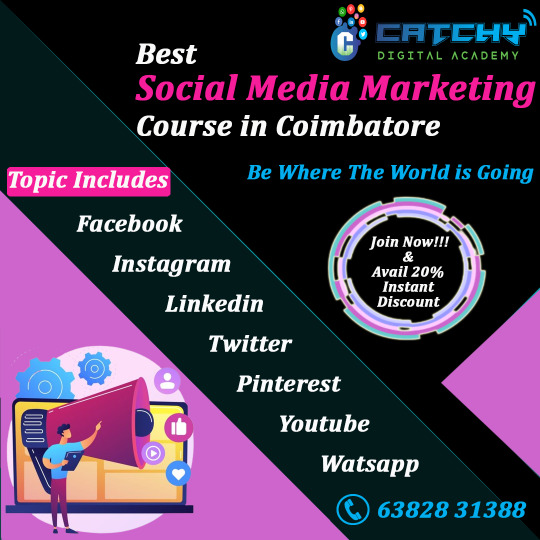
#digital marketing seo content marketing email marketing video promotion#Catchy Digital Academy is the best Digital marketing training institute in Coimbatore.#Our certified digital marketing training#will help you master the subject in theory and practical.#Good Opportunity and Right Time to Upgrade your Digital Marketing Skills.#This course helps you become a successful digital marketer with expertise in top domains like search engine optimization (SEO)#search engine marketing (SEM)#social media marketing (SMM)#social media advertising#affiliate marketing#web analytics#content marketing#and email marketing.#If you are looking for the best digital marketing course in Coimbatore.#Attend a Free Digital Marketing Demo and experience our quality and expertise.
0 notes
Text
what is digital marketing ?
Digital marketing refers to the use of digital channels, platforms, and technologies to promote products, services, or brands to a target audience. Unlike traditional marketing methods that rely on offline channels such as print, television, or radio, digital marketing leverages online channels to reach and engage with consumers. The goal of digital marketing is to connect with the target audience in the right place and at the right time, driving brand awareness, customer acquisition, and retention.
Key components of digital marketing include:
Search Engine Optimization (SEO): Optimizing a website or content to rank higher in search engine results, improving visibility and organic (non-paid) traffic.
Content Marketing: Creating and distributing valuable, relevant content to attract and engage a target audience. This can include blog posts, videos, infographics, and more.
Social Media Marketing: Utilizing social media platforms (such as Facebook, Instagram, Twitter, LinkedIn) to promote products or services, interact with the audience, and build brand awareness.
Email Marketing: Sending targeted messages and promotional content to a group of people via email to nurture leads, build customer relationships, and encourage conversions.
Pay-Per-Click (PPC) Advertising: Running paid advertisements on search engines or social media platforms, with advertisers paying a fee each time their ad is clicked.
Affiliate Marketing: Partnering with other businesses or individuals to promote products or services, with commissions earned for every sale or lead generated through the affiliate's efforts.
Influencer Marketing: Collaborating with influencers or individuals with a significant following to promote products or services to their audience.
Online Public Relations (PR): Managing a brand's online reputation and relationships with the public through various digital channels.
Analytics and Data Analysis: Monitoring and analyzing data from digital marketing efforts to measure performance, identify trends, and make informed decisions for future campaigns.
Digital marketing provides businesses with the flexibility to target specific demographics, track and measure campaign performance, and adjust strategies in real-time. It has become an integral part of the overall marketing strategy for many organizations in today's digital age.

#digital marketing#seo#seo services#online marketing#socialmediamarketing#search engine optimization
12 notes
·
View notes
Text
New Business Marketing Tips and Tricks for Success
Starting a new business can be an exhilarating adventure, but it also comes with its fair share of challenges, especially in the competitive landscape of today's marketplace. To stand out and thrive, effective marketing is crucial. Here are four essential marketing tips and tricks to help your new business succeed:
Define Your Target Audience and Create Customer Personas:
One of the first steps in crafting a successful marketing strategy for your new business is to identify and understand your target audience. Who are your ideal customers, and what are their needs, preferences, and pain points? Creating customer personas can help you visualize and humanize your audience, making it easier to tailor your marketing efforts effectively.

Start by conducting market research to gather data about your potential customers. Analyze demographics, psychographics, and behavior patterns to create detailed customer personas. These personas should include information like age, gender, income, interests, and pain points.
Once you have a clear understanding of your target audience, customize your marketing messages and strategies to resonate with them. Craft compelling content, advertisements, and promotions that address their specific needs and desires. By speaking directly to your ideal customers, you'll increase the chances of building meaningful connections and driving conversions.
Leverage the Power of Digital Marketing:
In the digital age, online presence and digital marketing are indispensable for any new business. Here are some essential digital marketing strategies to consider:
a. Build a User-Friendly Website: Your website is often the first point of contact for potential customers. Ensure that it is well-designed, easy to navigate, and mobile-responsive. Optimize it for search engines (SEO) to improve your visibility in search results.
b. Content Marketing: Create valuable and relevant content that educates, entertains, or solves problems for your target audience. Blog posts, videos, infographics, and social media updates can all be part of your content marketing strategy.

c. Social Media Marketing: Identify the social media platforms where your audience is most active and engage with them there. Develop a content calendar and use a mix of organic and paid content to reach a wider audience.
d. Email Marketing: Build and nurture an email list to stay in touch with your customers. Send personalized and relevant content, offers, and updates to keep them engaged and informed.
e. Pay-Per-Click Advertising (PPC): Consider running targeted PPC campaigns on platforms like Google Ads and Facebook Ads to reach potential customers actively searching for your products or services.
Emphasize Customer Relationships and Engagement:
In a competitive market, building and maintaining strong customer relationships is vital. Consider these strategies to enhance customer engagement:
a. Provide Exceptional Customer Service: Respond promptly to inquiries and address customer concerns with care. Happy customers are more likely to become loyal advocates for your brand.
b. Personalization: Use customer data and segmentation to personalize your marketing messages and offers. People appreciate tailored experiences that cater to their unique preferences.

c. Encourage User-Generated Content: Encourage customers to share their experiences with your products or services on social media or review platforms. User-generated content can build trust and credibility.
d. Loyalty Programs: Reward repeat customers with loyalty programs, discounts, or exclusive access to new products or services. Loyalty programs can foster long-term relationships and increase customer retention.
Monitor, Analyze, and Adapt:
Marketing is not a one-size-fits-all endeavor. To continually improve your strategies, track key performance indicators (KPIs) and adapt based on the data:
a. Use Analytics Tools: Employ tools like Google Analytics, social media insights, and email marketing metrics to monitor the performance of your marketing efforts.
b. A/B Testing: Experiment with different marketing approaches and compare their results through A/B testing. This allows you to refine your strategies over time.

c. Stay Informed: Keep up with industry trends, competitors, and evolving customer preferences. Stay open to adjusting your marketing plan as needed.
In conclusion, successful marketing for a new business involves understanding your audience, utilizing digital strategies, fostering customer relationships, and staying adaptable. By implementing these tips and tricks, your new business can navigate the competitive landscape and carve out its own path to success.
#seo#online marketing#digitalmarketing#marketing agency#learn digital marketing#digital marketing service#seo marketing#digital marketing course#digital marketing#seo expert#business success#business marketing#marketing tips
22 notes
·
View notes
Text
Digital Marketing Strategy
Set Clear Goals and Objectives: The first step in creating a digital marketing strategy is to define clear goals and objectives. These goals should be specific, measurable, attainable, relevant, and time-bound (SMART). Examples include increasing website traffic, generating leads, improving brand awareness, or driving online sales.
2. Understand Your Target Audience: To effectively reach and engage your target audience, it's important to understand their demographics, interests, behaviors, and pain points. Conduct market research, analyze customer data, and create buyer personas to gain insightful information about your target audience. This will help you tailor your digital marketing efforts to resonate with them.
3. Choose the Right Digital Channels: Identify the digital channels that are most relevant to your target audience and align with your marketing goals. Common digital channels include websites, search engines, social media platforms, email marketing, content marketing, mobile apps, and online advertising. Each channel has unique characteristics and advantages, so choose the ones that best suit your business and audience.
4. Develop Content Strategy: Content is at the heart of digital marketing. Create a content strategy that focuses on delivering value to your target audience. Plan and produce high-quality content that aligns with their interests, needs, and preferences. This can include blog articles, videos, infographics, eBooks, webinars, and social media posts. Consistency and relevance are key to establishing thought leadership and building trust with your audience.
5. Optimize for Search Engines: Implement search engine optimization (SEO) strategies to improve your website's visibility in search engine results. Conduct keyword research to identify relevant search terms and optimize your website's on-page elements, such as meta tags, headings, and content. Create high-quality backlinks from reputable websites to boost your website's authority.
6. Leverage Social Media: Utilize social media platforms to connect with your audience, build brand awareness, and foster engagement. Identify the platforms where your target audience is most active and create compelling content tailored to each platform. Engage in conversations, respond to comments, and encourage user-generated content to cultivate a sense of community and brand loyalty.
7. Implement Email Marketing: Email marketing remains an effective way to nurture leads and engage with existing customers. Develop an email marketing strategy that includes personalized and segmented email campaigns. Provide valuable content, offers, and promotions to your subscribers, and automate email sequences to streamline your communication.
8. Monitor, Measure, and Adjust: Regularly monitor the performance of your digital marketing efforts using analytics tools. Track key performance indicators (KPIs) such as website traffic, conversion rates, engagement metrics, and ROI. Use the insights gained to identify areas for improvement and make data-driven adjustments to optimize your strategy.
9. Stay Updated and Evolve: The digital marketing landscape is constantly evolving. Stay updated with the latest trends, technologies, and industry best practices. Experiment with new channels and tactics to reach your audience. Continuously adapt your strategy based on market changes and feedback from your audience.
10. Evaluate and Refine: Regularly evaluate the effectiveness of your digital marketing strategy against your goals. Identify successes, challenges, and areas of improvement. Refine your strategy based on the insights gained to ensure continuous growth and success.
11. In summary, a well-rounded digital marketing strategy involves setting clear goals, understanding your audience, choosing the right channels, creating valuable content, optimizing for search engines, leveraging social media and email marketing, monitoring and measuring performance, staying updated, and evaluating and refining your approach. By following these steps, businesses can effectively harness the power of digital marketing to achieve their objectives and drive sustainable growth.
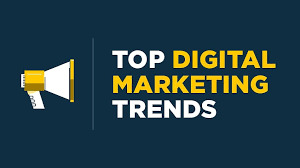
19 notes
·
View notes
Text
Lead Generation for E-commerce: Tactics to Drive Online Sales
Article by Jonathan Bomser | CEO | AccountSend.com
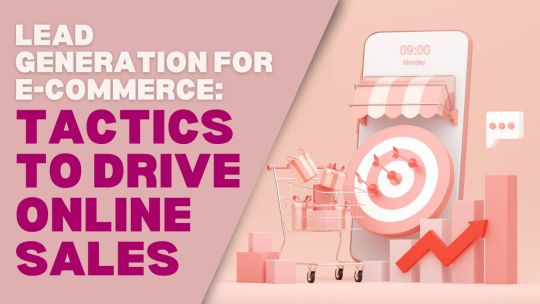
In today's dynamic digital landscape, the world of e-commerce is thriving like never before, offering businesses unparalleled opportunities to connect with a global audience. However, within this digital marketplace, the pursuit of increased online sales comes with its unique set of challenges. This is where the strategic art of lead generation steps in. In this article, we're about to embark on an enlightening journey through seven innovative tactics that promise to optimize your lead generation strategies and drive a remarkable surge in your online sales, setting the stage for business growth and expansion.
Download the infographic here!
Optimize Your Website for Conversions: Imagine your website as a virtual storefront, a welcoming entry point for potential customers into your digital universe. Ensuring that this first interaction is seamless and impactful is a crucial foundation for success. The concept of website optimization goes beyond aesthetics, diving deep into the realm of user experience. It's about strategically integrating compelling calls-to-action (CTAs), facilitating smooth checkout processes, and ensuring that your website is responsive and accessible across mobile devices. Each of these elements collaborates to create an environment that not only engages visitors but also fuels B2B lead generation, ultimately leading to increased conversions.
Implement SEO Best Practices: Navigating the vast expanse of the digital landscape requires a strategic compass. Search engine optimization (SEO) is that compass, guiding your brand towards higher visibility and discoverability. By refining your website and content to align with search engine algorithms, you pave a path for potential customers to easily find you. This journey involves meticulous keyword research, the cultivation of authoritative backlinks, and the crafting of top-notch content. Together, these elements elevate your brand's presence in search engine rankings, positioning you as an authority in your niche and drawing organic traffic to your virtual doorstep.
Harness the Power of Content Marketing: In a world driven by information and engagement, content marketing emerges as a beacon of connection. This dynamic strategy involves creating and disseminating valuable, relevant content that resonates with your target audience. From thought-provoking blog posts and visually captivating infographics to immersive videos and educational webinars, content marketing weaves a narrative that not only builds brand credibility but also educates potential leads. By serving as a bridge between information and conversion, content marketing shapes a customer journey that is both meaningful and impactful.
Leverage Social Media Advertising: In the realm of social media, where connections are forged and conversations thrive, lies an untapped reservoir of advertising potential. Platforms such as Facebook, Instagram, and LinkedIn offer a treasure trove of advertising options equipped with advanced targeting capabilities. These tools empower you to direct your messages towards potential customers based on their behaviors, preferences, and demographics. This laser-focused approach brings your brand to the forefront of your audience's attention, fostering recognition, trust, and ultimately, sales conversions.
youtube
Engage in Email Marketing: Amidst the whirlwind of digital advancements, email marketing remains a steadfast pillar in the lead generation landscape. It's the art of personalized communication, where each email serves as a conduit for tailored promotions, informative content, and the nurturing of leads. Cultivating a robust email list lays the foundation for strategic email campaigns, where the crafting of compelling content fosters a direct and intimate relationship between your brand and potential customers. This relationship, in turn, fuels conversions and drives your e-commerce success.
Partner with Influencers: The power of influence is a force to be reckoned with in the digital era. By collaborating with influencers who hold sway over your target audience, you unlock an avenue of amplified visibility and credibility. These influencers, with their engaged online following, introduce your brand to a wider audience, fostering trust and recognition. The partnership forms a symbiotic relationship, driving both your brand's growth and the influencer's engagement, a testament to the transformative potential of influencer marketing in e-commerce.
Use Retargeting Campaigns: In the intricate dance of e-commerce, not every lead converts immediately. This is where retargeting campaigns step in, reminding potential customers of their engagement with your brand. These campaigns strategically place ads on social media platforms or deliver timely email reminders, gently nurturing warm leads and guiding them towards conversion. By maintaining a consistent presence in their digital landscape, you increase the chances of converting engaged leads into loyal customers.
In summation, the realm of e-commerce lead generation is a symphony of strategies. From website optimization to content marketing, social media finesse, influencer collaboration, and the art of retargeting, each tactic plays a distinct role in enhancing lead generation, elevating conversion rates, and propelling your online sales to unprecedented heights. As you embark on this dynamic journey, remember that success lies in not just embracing these strategies but also in adapting them to the evolving e-commerce trends and the unique pulse of your business. Your commitment to continuous refinement and innovation will undoubtedly chart a course towards sustained e-commerce triumph.
#AccountSend#BusinessOwnersDatabase#VerifiedB2BEmails#B2BContactDatabase#CEOEmailAddresses#SalesLeadsDatabase#B2BEmailList#B2BLeadsDatabase#VerifiedBusinessLeads#B2BLeadsList#Youtube
21 notes
·
View notes
Text
Digital Marketing Services for Kids Explained by Web Digital Store
Hey there! Have you ever heard of "digital marketing"? It sounds fancy, right? But don't worry, Web Digital Store is here to explain it in a super easy way. Imagine you have a toy, and you want to show everyone how awesome it is so they buy it. Digital Marketing Services is a lot like that! We use cool tricks on the internet to help people know about fun products, games, or services. Let’s dive in and learn how this works!
What is Digital Marketing?
Digital marketing means promoting or showing off products and services using the internet. Instead of just telling your friends about something, digital marketing lets companies like Web Digital Store show their stuff to people all over the world through websites, social media, and more!
Why is Digital Marketing Important?
Think about it—most of us use the internet every day, right? We watch videos, play games, and chat with friends online. So, if you want people to know about a new game or product, the best place to talk about it is online! That’s why Digital Marketing Services is super important.
Types of Digital Marketing Services at Web Digital Store
Web Digital Store has different ways to help companies get noticed online. Let’s check out some of the cool services we offer!
1. Social Media Marketing
Have you ever seen ads on Instagram, Facebook, or TikTok? That’s social media marketing! Web Digital Store helps companies create fun posts and videos that can make their products go viral.
How It Works:
We create posts with catchy words and colorful pictures.
These posts pop up when you're scrolling through your social media apps.
If the posts are cool enough, people click on them, learn more, and might even buy the product!
2. Search Engine Optimization (SEO)
Ever wonder why some websites show up first when you search for something on Google? That’s because of SEO! Web Digital Store knows how to make websites easier to find.
How It Works:
We pick the best words people might search for, like “cool toys” or “fun games.”
Then, we add those words to a company’s website so Google knows it’s important.
This helps the site rank higher and be seen by more people.
3. Email Marketing
Ever got a fun newsletter or an offer in your inbox? That’s email marketing! Web Digital Store helps companies send emails that people actually want to open.
How It Works:
We create emails that share new products, deals, or updates.
These emails go straight to people’s inboxes.
If someone likes what they see, they might click on the link and visit the website.
4. Content Marketing
Content is just a fancy word for anything written, drawn, or made. This could be blogs, videos, or even cartoons! Web Digital Store helps companies create awesome content to catch people's attention.
How It Works:
We write fun blogs, make exciting videos, or design cute images.
These get shared on the company’s website or social media.
When people enjoy the content, they’re more likely to trust the company and buy from them.
5. Paid Advertising
Sometimes companies pay to have their ads shown to more people. Have you seen an ad pop up while watching a YouTube video? That’s paid advertising, and Web Digital Store can help companies get their ads in front of lots of people.
How It Works:
Companies pay to place their ads on popular websites, YouTube, or social media.
These ads are shown to people who might be interested in the product.
If someone clicks the ad, they can go to the company’s website and learn more.
6. Influencer Marketing
Ever seen your favorite YouTuber or Instagram star talk about a product? That’s influencer marketing! Web Digital Store connects companies with influencers who can share products with their followers.
How It Works:
We find popular online personalities who match the company’s brand.
These influencers review, use, or talk about the company’s products.
Their followers see the product and might want to try it too!
How Web Digital Store Makes Digital Marketing Fun
At Web Digital Store, we love making digital marketing fun and easy to understand! We use games, colorful designs, and exciting words to catch people’s attention. It’s kind of like telling a really cool story, but on the internet.
Creative Designs
We create colorful pictures, fun videos, and catchy graphics that people will want to share with their friends. The more people share, the more the company gets noticed.
Cool Videos and Animations
Who doesn’t love a good video? We make short, fun videos that explain products or services in a way that keeps you watching.
Why Web Digital Store is the Best Choice for Digital Marketing
There are a lot of digital marketing services companies out there, but Web Digital Store stands out because we care about making things simple and fun for everyone—even kids! Our team of experts knows how to create fun and friendly content that grabs attention.
We Make Things Easy to Understand
We don’t use confusing words or boring stuff. Our goal is to make digital marketing fun and easy, whether you're a kid or an adult.
We Stay Up to Date
The internet is always changing. New apps, games, and trends come out all the time. Web Digital Store stays on top of the latest trends so that we can help companies reach people in the coolest ways.
We Love Creativity
Web Digital Store believes that creativity is the key to making great digital marketing. We use our imagination to come up with fresh ideas that get people excited about the products we promote.

Conclusion
Digital marketing is a fun way to show people all the cool products and services out there using the internet. From social media to videos and emails, Web Digital Store helps companies get their products in front of people in creative and fun ways. Now you know what digital marketing services is all about and how Web Digital Store makes it awesome for everyone.
#digital marketing services#best digital marketing company in usa#best digital marketing company#digital marketing agency usa#best online marketing company#top digital marketing company in usa
2 notes
·
View notes
Text
What is Digital Marketing?
Digital marketing is the practice of promoting products, services, or brands through digital channels such as the internet, social media, search engines, email, and mobile apps. It encompasses a wide range of strategies and tactics designed to connect with potential customers and drive engagement, conversions, and sales. Here are some key components of digital marketing:

Search Engine Optimization (SEO): The process of optimizing a website to rank higher in search engine results pages (SERPs) to increase organic (non-paid) traffic.
Content Marketing: Creating and distributing valuable, relevant content to attract and engage a target audience. This can include blog posts, articles, videos, infographics, and more.
Social Media Marketing: Using social media platforms like Facebook, Twitter, Instagram, LinkedIn, and others to promote products and interact with customers. This can involve organic posts, paid ads, and influencer partnerships.
Email Marketing: Sending targeted emails to a list of subscribers to promote products, share news, or nurture relationships with customers. Effective email marketing involves personalized content and strategic timing.
Pay-Per-Click (PPC) Advertising: Running ads on search engines or social media platforms where advertisers pay a fee each time their ad is clicked. Google Ads and Facebook Ads are common PPC platforms.
Affiliate Marketing: Partnering with other businesses or individuals (affiliates) who promote your products in exchange for a commission on sales they generate.
Influencer Marketing: Collaborating with influential people in a particular niche to promote your products or services to their followers.
Online Public Relations (PR): Managing a brand's online reputation through activities like press releases, media outreach, and engaging with online communities.
Conversion Rate Optimization (CRO): Improving the effectiveness of a website or landing page to increase the percentage of visitors who take a desired action, such as making a purchase or filling out a form.
Analytics and Reporting: Using tools like Google Analytics to track and analyze the performance of digital marketing campaigns. This data helps marketers understand what’s working and where improvements are needed.
#digital marketing#digital marketing service#seo services#social media marketing#search engine optimization#website development#web design#best web development company#web developing company#software development#digital marketing solutions
3 notes
·
View notes
Text
Does digital marketing have a good scope in India?
Digital marketing has been experiencing a meteoric rise in India, transforming the way businesses engage with their customers. With a vast population and increasing internet penetration, the Indian market offers immense potential for digital marketers.
Why Digital Marketing is a Promising Field in India:
Growing Internet Penetration: The number of internet users in India has been steadily increasing, providing a vast audience for businesses to reach. This growth has created a fertile ground for digital marketing strategies.
Evolving Consumer Behavior: Indian consumers are becoming increasingly tech-savvy and prefer online shopping and research. This shift in consumer behavior has made digital marketing a crucial component of any successful business strategy.
Diverse Market: India's diverse market with different languages, cultures, and preferences presents unique opportunities for targeted digital marketing campaigns.
Rising E-commerce: The e-commerce industry in India is booming, creating a high demand for digital marketing services to promote online businesses and drive sales.
Affordable Digital Marketing Solutions: Compared to traditional marketing channels, digital marketing offers cost-effective solutions for businesses of all sizes.
Scope of Digital Marketing in India:
Social Media Marketing: Platforms like Facebook, Instagram, Twitter, and LinkedIn have become essential for reaching and engaging with the Indian audience.
Search Engine Optimization (SEO): Optimizing websites for search engines like Google helps businesses rank higher in search results and attract organic traffic.
Content Marketing: Creating valuable and engaging content, such as blog posts, articles, and videos, helps businesses establish authority and attract potential customers.
Pay-Per-Click (PPC) Advertising: Running targeted ads on search engines and social media platforms can help businesses generate quick results and reach specific audiences.
Email Marketing: Building and nurturing email lists allows businesses to send personalized messages and drive customer loyalty.
Influencer Marketing: Collaborating with influencers who have a strong following can help businesses reach a wider audience and build credibility.
In conclusion, digital marketing offers a vast scope in India, driven by increasing internet penetration, evolving consumer behavior, and the growth of the e-commerce industry. Businesses that embrace digital marketing strategies can tap into the immense potential of the Indian market and achieve significant growth.

2 notes
·
View notes
Text
The Evolution of Digital Marketing Solutions: Strategies for Success
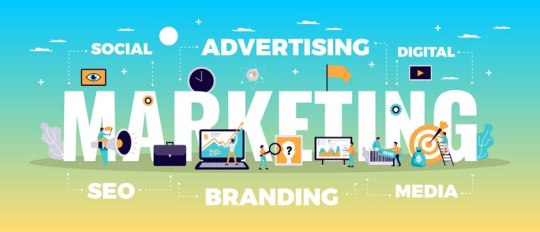
In today's fast-paced digital world, businesses must adopt effective digital marketing solutions to remain competitive and relevant. As consumer behavior shifts increasingly online, traditional marketing methods alone no longer suffice. Digital marketing offers a vast array of tools and strategies that enable businesses to reach their target audience more efficiently and effectively. This article explores the evolution of digital marketing solutions and outlines key strategies for success.
Understanding Digital Marketing Solutions
Digital marketing Solutions encompasses all marketing efforts that use an electronic device or the internet. Businesses leverage digital channels such as search engines, social media, email, and websites to connect with current and prospective customers. Key components of digital marketing include:
Search Engine Optimization (SEO): This involves optimizing a website to rank higher in search engine results pages (SERPs), thereby increasing organic (non-paid) traffic. SEO strategies include keyword research, content creation, and technical website improvements.
Content Marketing: This focuses on creating and distributing valuable, relevant, and consistent content to attract and engage a clearly defined audience. Blogs, videos, infographics, and ebooks are common content marketing tools.
Social Media Marketing: Utilizing platforms like Facebook, Instagram, LinkedIn, and Twitter to promote products and services, engage with customers, and build brand awareness. Social media marketing can be organic or paid (social media ads).
Email Marketing: Sending targeted emails to a group of subscribers to promote products, share news, or nurture relationships. Email marketing remains one of the most cost-effective digital marketing strategies.
Pay-Per-Click (PPC) Advertising: This is a model where advertisers pay a fee each time one of their ads is clicked. Google Ads is a popular PPC platform that helps drive traffic to websites through paid search engine results.
Affiliate Marketing: Partnering with other businesses or influencers who promote your products in exchange for a commission on sales generated through their referral.
Influencer Marketing: Collaborating with influencers who have a large following to promote your brand. This strategy leverages the influencer's credibility and reach to connect with potential customers.
The Evolution of Digital Marketing
Digital marketing has evolved significantly over the past two decades. Early internet marketing efforts were largely experimental, focusing on basic website creation and banner ads. As technology advanced and the internet became more accessible, digital marketing strategies grew more sophisticated.
The rise of search engines in the late 1990s and early 2000s led to the development of SEO, a cornerstone of modern digital marketing. Around the same time, email marketing began to gain traction as businesses realized the potential of direct communication with customers.
Social media platforms emerged in the mid-2000s, revolutionizing how businesses engage with their audience. Initially used primarily for personal connections, social media quickly became a powerful marketing tool. The introduction of social media advertising further expanded the possibilities for targeted marketing.
Content marketing gained prominence in the 2010s as businesses recognized the value of providing informative and engaging content to attract and retain customers. This era also saw the rise of influencer marketing, driven by the growing popularity of social media influencers.
Today, digital marketing Solutions continues to evolve with advancements in artificial intelligence (AI), machine learning, and data analytics. These technologies enable more personalized and data-driven marketing strategies, improving efficiency and effectiveness.
Key Strategies for Success
To succeed in digital marketing, businesses must adopt a strategic approach that combines various digital marketing solutions. Here are key strategies for success:
Define Clear Objectives: Establish specific, measurable, achievable, relevant, and time-bound (SMART) goals. Clear objectives guide your digital marketing efforts and help measure success.
Understand Your Audience: Conduct thorough market research to understand your target audience's needs, preferences, and behaviors. Create detailed buyer personas to guide your marketing strategies.
Create High-Quality Content: Invest in creating valuable and engaging content that addresses your audience's pain points and interests. Quality content builds trust and authority in your industry.
Leverage Data Analytics: Use analytics tools to track and analyze your marketing performance. Data insights help refine strategies, optimize campaigns, and improve ROI.
Embrace Omnichannel Marketing: Ensure a consistent and seamless experience across all digital channels. An omnichannel approach enhances customer engagement and retention.
Stay Updated with Trends: Digital marketing is dynamic and constantly evolving. Stay informed about the latest trends, technologies, and best practices to stay ahead of the competition.
Test and Optimize: Continuously test different strategies and tactics to identify what works best. Optimization is an ongoing process that enhances the effectiveness of your digital marketing efforts.
Conclusion
Digital marketing solutions have transformed how businesses connect with their audience, offering unparalleled opportunities for growth and success. By understanding the evolution of digital marketing and adopting key strategies, businesses can harness the power of digital channels to achieve their marketing goals. In an ever-changing digital landscape, staying adaptable, informed, and customer-focused is the key to thriving in the digital age.
4 notes
·
View notes
Text
Unlocking the Power of Digital Marketing in 2024: Key Strategies for Success In today's fast-evolving digital landscape, businesses need a strong online presence to stay competitive. Digital marketing has emerged as the go-to strategy for brands looking to connect with their target audience, boost sales, and build lasting relationships. At Digital Marketing Lab, we explore the latest trends, strategies, and tools that can transform your business into a digital powerhouse.
Why Digital Marketing Matters More Than Ever With over 5 billion people using the internet worldwide, having a digital strategy is no longer optional. Consumers increasingly rely on online platforms to discover, evaluate, and purchase products or services. This growing reliance on digital channels offers businesses endless opportunities to engage and convert potential customers.
In 2024, digital marketing continues to evolve, with a focus on personalization, automation, and omnichannel experiences. Whether you're a small business or a large enterprise, an effective digital marketing strategy can help you reach a wider audience, improve customer engagement, and drive growth.
Key Digital Marketing Strategies for 2024 To stay ahead of the curve, here are the top digital marketing strategies to implement in 2024:
Content Marketing Content remains king, but the way businesses approach it is changing. High-quality, value-driven content that speaks directly to your audience’s needs will drive better engagement. This includes blog posts, videos, infographics, podcasts, and more. Interactive content like polls, quizzes, and surveys is also gaining traction as it encourages user participation.
Search Engine Optimization (SEO) SEO continues to be a critical pillar of digital marketing. Google and other search engines are constantly updating their algorithms to prioritize websites with the best user experience. In 2024, focus on core web vitals, mobile-first indexing, and voice search optimization to ensure your site ranks well. Local SEO is also becoming more important as consumers search for businesses “near me.”
Social Media Marketing Social media platforms such as Instagram, Facebook, LinkedIn, and TikTok remain powerful tools for brand promotion. Leveraging influencer marketing, user-generated content, and short-form videos can enhance your brand’s visibility. In 2024, we expect more brands to use AI-powered social listening tools to better understand their audience and respond to trends in real time.
Email Marketing and Personalization Email marketing is far from obsolete—in fact, it’s more effective than ever when combined with personalization. Consumers expect brands to deliver relevant, personalized messages that cater to their individual preferences. Using AI tools to segment audiences and create automated email flows based on user behavior can help boost engagement and conversions.
Pay-Per-Click Advertising (PPC) PPC remains a go-to strategy for instant visibility. Platforms like Google Ads, Facebook Ads, and Instagram Ads offer highly targeted campaigns that reach specific audiences. In 2024, AI-driven campaign management tools will take PPC to the next level, optimizing budgets, targeting, and ad placements for maximum ROI.
Video Marketing Video is rapidly becoming the preferred medium for online users, making it an essential part of any digital marketing strategy. Whether it's short, engaging TikToks, in-depth YouTube tutorials, or live streams on Instagram, businesses need to incorporate video content to connect with their audiences. In 2024, shoppable videos and interactive livestreams will dominate the video marketing scene.
AI and Automation Artificial intelligence and automation tools are transforming the digital marketing landscape. From chatbots that provide instant customer service to AI-driven content creation, businesses are leveraging technology to improve efficiency and customer experience. Tools like predictive analytics and machine learning also enable marketers to make data-driven decisions, enhancing campaign success rates.
Staying Ahead in the Digital Marketing Game The digital marketing world is constantly evolving, but the fundamentals remain the same: know your audience, provide value, and adapt to new trends and technologies. Whether you're looking to revamp your existing strategy or build a new one from the ground up, keeping an eye on these key trends will ensure your brand stays competitive in 2024.
At Digital Marketing Lab, we're committed to helping businesses navigate the complexities of digital marketing. We provide actionable insights, tips, and resources to help you grow your online presence and achieve your business goals.
Know More: https://digitalmarketinglab.in/
2 notes
·
View notes
Text
A Guide to Instagram Influencer Marketing for Businesses
Instagram has evolved beyond a platform for sharing photos – it's become a powerful avenue for businesses to connect with their audience through influencer marketing. Leveraging Instagram influencers can significantly boost brand visibility, engagement, and conversions. Here's a comprehensive guide to navigate and maximize the potential of Instagram influencer marketing for businesses, curated by a leading social media marketing agency in the UK.

Understanding Influencer Marketing on Instagram
Identifying the Right Influencers: Define your target audience and align with influencers whose demographics match your ideal customers.
Engagement and Reach: Analyze an influencer's engagement rate, reach, and authenticity through their content before collaboration.
Types of Influencers: Choose between macro-influencers with larger audiences or micro-influencers for niche, engaged communities.
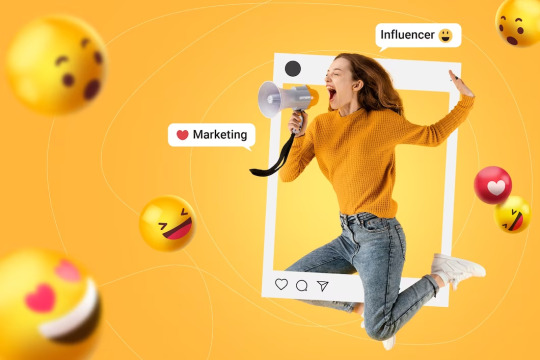
Crafting an Effective Influencer Marketing Strategy
Defining Goals and Objectives: Determine clear objectives for social media marketing whether it's brand awareness, lead generation, or sales conversions.
Content Collaboration: Collaborate with influencers to create authentic, engaging content that resonates with your brand's ethos and appeals to their followers.
Campaign Execution: Plan campaigns that align with your brand's narrative and the influencer's style to create a cohesive and impactful message.
Measuring Success and ROI
Performance Metrics: Track performance metrics such as engagement rates, click-through rates, conversions, and return on investment (ROI).
Monitoring and Analysis: Use analytics tools to assess the success of influencer campaigns and refine strategies for future collaborations.
Best Practices and Tips
Legal Compliance: Ensure compliance with advertising regulations and disclosure requirements for sponsored content.
Long-term Relationships: Nurture long-term relationships with influencers for consistent brand advocacy and audience engagement.
Elevating Your Website with Instagram Influencer Marketing
Instagram influencer marketing stands as a potent tool for businesses aiming to amplify their online presence. Leveraging the expertise of a top-tier social media marketing agency in the UK ensures effective influencer collaborations that align seamlessly with your brand's objectives.
#Marketing Agency UK#Advertising Services UK#Digital Marketing Solutions UK#Creative Marketing Strategies UK#Brand Promotion UK#Social Media Marketing UK#Content Marketing UK#SEO Services UK#PPC Advertising UK#Online Marketing UK#Branding Experts UK#Marketing Consultancy UK#Marketing Campaigns UK#Marketing Analytics UK#Website Optimization UK#Graphic Design Services UK#Video Marketing UK#Lead Generation UK#Marketing ROI UK#Email Marketing UK
0 notes
Text
Social Media Agency
We provide maximum assurance for your business promotion through social media marketing.
If you need any type of business marketing contact us on
Facebook Twitter Gmail

Here’s a way you could present your services:
Our services include the following:
PPC Advertising: We use a unique pay-per-click strategy (ppc services) to provide vital tools for our customers and help them maximize their customer base.
Email marketing: We help our customers to increase their growth and profitability by collaborating in their email campaigns.
SEO services: We help our customers to optimize their website for relevant keywords, monitor domains, backlinks and other latest SEO strategies. Implementing all these help to enhance website visibility in the search engines.
Social media services: We help our customers with [mention social media offerings] to gain visibility on social media platforms and channels. We also provide detailed analytics to help understand how to improve moving forward.
Web design: We specialize in designing beautiful websites and creating engaging content for your website.
Video content: We create video content to help ensure your approach to digital marketing is comprehensive and innovative.
#digital marketing#marketing#digital marketing agency#social media#digital marketing services#social media management#social media services
9 notes
·
View notes
Text
DIGITAL MARKETING
DIGITAL MARKETING
What is Digital Marketing?
Digital marketing encompasses all marketing efforts that use the internet or electronic devices. It includes various channels such as:
Search Engine Optimization (SEO): Improving website visibility on search engines.
Content Marketing: Creating and distributing valuable content to attract and engage a target audience.
Social Media Marketing: Utilizing platforms like Facebook, Instagram, and Twitter to engage with customers and promote products.
Email Marketing: Sending targeted emails to nurture leads and communicate with customers.
Pay-Per-Click (PPC) Advertising: Running paid ads on search engines and social media to drive traffic.
The Importance of Digital Marketing
Wider Reach: Unlike traditional marketing, digital marketing allows businesses to reach a global audience. With the right strategies, brands can connect with customers across different regions, demographics, and interests.
Cost-Effectiveness: Digital marketing often requires a lower budget than traditional methods. Small businesses can leverage social media and content marketing to promote their products without breaking the bank.
Targeted Advertising: Digital marketing tools enable businesses to target specific demographics based on user behavior, interests, and location. This precision leads to higher conversion rates and better return on investment (ROI).
Measurable Results: One of the significant advantages of digital marketing is the ability to track and analyze performance in real-time. Tools like Google Analytics provide insights into user behavior, allowing marketers to adjust their strategies accordingly.
Enhanced Customer Engagement: Digital platforms facilitate direct communication with customers. Brands can respond to inquiries, gather feedback, and build relationships, fostering loyalty and trust.
Trends Shaping the Future of Digital Marketing
As technology continues to advance, several trends are emerging in digital marketing:
Artificial Intelligence (AI): AI is transforming how businesses understand consumer behavior, personalize experiences, and automate processes.
Voice Search Optimization: With the rise of smart speakers and voice assistants, optimizing content for voice search is becoming essential.
Video Marketing: Video content is increasingly popular, with platforms like YouTube and TikTok driving engagement. Brands are leveraging live streaming and short-form videos to connect with audiences.
Influencer Marketing: Collaborating with influencers can amplify brand messages and reach niche audiences effectively.
Conclusion
Digital marketing is no longer just an option; it’s a necessity for businesses looking to succeed in a competitive landscape. By embracing digital strategies, companies can enhance their visibility, engage with customers, and drive growth. As technology continues to evolve, staying ahead of digital marketing trends will be crucial for future success.
2 notes
·
View notes
Text
Types of Digital Marketing
Content Marketing: Used to attract, engage, and retain an audience by creating and sharing relevant content.
Email Marketing: Personalize campaigns to engage with your audience directly.
Search Engine Optimization (SEO): Optimize your content to rank higher on search engines.
Affiliate Marketing: Partner with affiliates to promote your products.
Social Media Marketing: Boost brand awareness through social platforms.
Pay-per-Click (PPC): Drive traffic with paid ads.
App Store Optimization (ASO): Increase app visibility in stores.
Video Marketing: Create engaging videos to capture attention.
📧 Mail us: [email protected] 📞 Call us: +91-7617707771

#DigitalMarketing#SEO#ContentMarketing#SocialMedia#PPC#EmailMarketing#VideoMarketing#UpXpert#GrowYourBrand#Contactus#Digital#WebServices#AffiliateMarketing#SMM#A
2 notes
·
View notes
Text
DIGITAL MARKETING-WEB PULSE
Digital marketing is a broad field encompassing various strategies and tools used to promote products, services, or brands online. It leverages digital channels and technologies to reach and engage with target audiences. Here’s a breakdown of some key components:
Search Engine Optimization (SEO): Enhancing website content and structure to rank higher in search engine results pages (SERPs), thereby increasing organic (non-paid) traffic.
Content Marketing: Creating and distributing valuable content (such as blog posts, videos, infographics) to attract and engage a target audience, ultimately driving profitable customer action.
Social Media Marketing: Utilizing platforms like Facebook, Instagram, Twitter, LinkedIn, and others to connect with audiences, build brand awareness, and drive traffic.
Email Marketing: Sending targeted emails to nurture leads, engage existing customers, and drive conversions. This can include newsletters, promotional offers, and personalized content.
Pay-Per-Click (PPC) Advertising: Running paid ads on platforms like Google Ads or social media channels, where advertisers pay each time their ad is clicked. This can drive targeted traffic and generate leads quickly.
Affiliate Marketing: Partnering with other businesses or individuals (affiliates) who promote your products or services in exchange for a commission on sales or leads they generate.
Influencer Marketing: Collaborating with influential individuals or creators in your industry to promote your brand or products to their followers.
Analytics and Data Analysis: Using tools like Google Analytics to track and analyze digital marketing efforts, measure performance, and make data-driven decisions.
Online Public Relations (PR): Managing your brand’s online reputation and building relationships with digital media and influencers to gain positive coverage and enhance credibility.
Mobile Marketing: Reaching audiences through mobile devices via mobile apps, SMS, push notifications, and mobile-optimized websites.
Each component works together to create a cohesive strategy that helps businesses achieve their marketing goals, whether that’s increasing brand awareness, generating leads, or driving sales.

#digital art#digital marketing#tech#seo services#ppc services#e commerce#business#design#growth#grow your business#website
2 notes
·
View notes